
Metal Gear Solid is an action-adventure stealth video game developed and published by Konami for the PlayStation in 1998. It was directed, produced, and written by Hideo Kojima, and follows the MSX2 video games Metal Gear and Metal Gear 2: Solid Snake, which Kojima also worked on. It was unveiled at the 1996 Tokyo Game Show and then demonstrated at trade shows including the 1997 Electronic Entertainment Expo; its Japanese release was originally planned for late 1997, before being delayed to 1998.
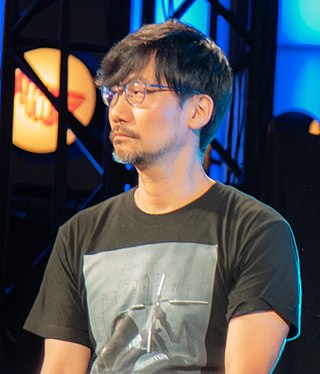
Hideo Kojima is a Japanese video game designer. He is regarded as an auteur of video games. He developed a strong passion for film and literature during his childhood and adolescence. In 1986, he was hired by Konami, for which he designed and wrote Metal Gear (1987) for the MSX2, a game that laid the foundations for stealth games and the Metal Gear series, his best known and most appreciated works. At Konami, he also produced the Zone of the Enders series, as well as wrote and designed Snatcher (1988) and Policenauts (1994), graphic adventure games regarded for their cinematic presentation.

Solid Snake is a fictional character from the Metal Gear series created by Hideo Kojima and developed and published by Konami, appearing as the main protagonist in many of the games of the series. He is depicted as a former Green Beret and highly skilled special operations soldier engaged in solo stealth and espionage missions who is often tasked with destroying models of the bipedal nuclear weapon-armed mecha known as Metal Gear. Controlled by the player, he must act alone, supported via radio by commanding officers and specialists. While his first appearances in the original Metal Gear games were references to Hollywood films, the Metal Gear Solid series has given a consistent design by artist Yoji Shinkawa alongside an established personality while also exploring his relationship with his mentor and father.
Metal Gear is a franchise of stealth games created by Hideo Kojima. Developed and published by Konami, the first game, Metal Gear, was released in 1987 for MSX home computers. The player often takes control of a special forces operative, who is assigned the task of finding the titular superweapon, "Metal Gear", a bipedal walking tank with the ability to launch nuclear weapons.
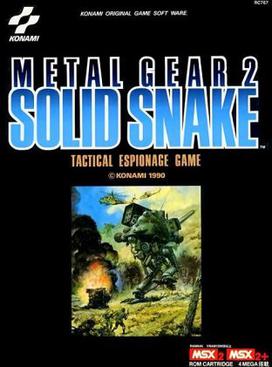
Metal Gear 2: Solid Snake is a 1990 action-adventure stealth video game developed and published by Konami for the MSX2 computer platform. It serves as a sequel to the MSX2 version of the original Metal Gear, written and designed by series's creator Hideo Kojima, who conceived the game in response to Snake's Revenge, a separately-produced sequel that was being developed at the time for the NES specifically for the North American and European markets. The MSX2 version of Solid Snake was only released in Japan, although Kojima would later direct another sequel titled Metal Gear Solid, which was released worldwide for the PlayStation in 1998 to critical acclaim. This later led to Solid Snake being re-released alongside the original Metal Gear as additional content in the Subsistence version of Metal Gear Solid 3 for the PlayStation 2 in 2005. It was also included in the HD remastered ports of Metal Gear Solid 3 released for PlayStation 3, PlayStation Vita, and Xbox 360, and was given a standalone re-release in Japan as a downloadable game for mobile phones and the Wii Virtual Console.
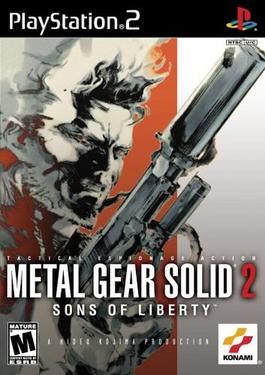
Metal Gear Solid 2: Sons of Liberty is a 2001 action-adventure stealth video game developed by Konami Computer Entertainment Japan and published by Konami for the PlayStation 2. Originally released on November 13, 2001, it is the fourth Metal Gear game produced by Hideo Kojima, the seventh overall game in the series and is a sequel to Metal Gear Solid (1998). An expanded edition, titled Metal Gear Solid 2: Substance, was released the following year for Xbox and Windows in addition to the PlayStation 2. A remastered version of the game, Metal Gear Solid 2: Sons of Liberty - HD Edition, was later included in the Metal Gear Solid HD Collection for the PlayStation 3, Xbox 360, and PlayStation Vita. The HD Edition of the game was included in the Metal Gear Solid: Master Collection Vol. 1 compilation for Nintendo Switch, PlayStation 4, PlayStation 5, Windows, and Xbox Series X/S, which was released on October 24, 2023.

Metal Gear Solid 3: Snake Eater is a 2004 action-adventure stealth video game developed and published by Konami for the PlayStation 2. It was released in late 2004 in North America and Japan, and in early 2005 in Europe and Australia. It was the fifth Metal Gear game written and directed by Hideo Kojima and serves as a prequel to the entire Metal Gear series. An expanded edition, titled Metal Gear Solid 3: Subsistence, was released in Japan in late 2005, then in North America, Europe and Australia in 2006. A remastered version of the game, Metal Gear Solid 3: Snake Eater - HD Edition, was later included in the Metal Gear Solid HD Collection for the PlayStation 3, Xbox 360, and PlayStation Vita, while a reworked version, titled Metal Gear Solid: Snake Eater 3D, was released for the Nintendo 3DS in 2012. The HD Edition of the game was included on the Metal Gear Solid: Master Collection Vol. 1 compilation for Nintendo Switch, PlayStation 4, PlayStation 5, Windows, and Xbox Series X/S on October 24, 2023. The same year, Konami announced a remake, entitled Metal Gear Solid Delta: Snake Eater, set to release for PlayStation 5, Windows, and Xbox Series X/S in 2024.

David Hayter is a Canadian-American actor, screenwriter, director, and producer. He is well known as the English-language voice actor for Solid Snake and Naked Snake in the Metal Gear video game series. He wrote the film X-Men and co-wrote X2 and Watchmen, and was awarded the Saturn Award for Best Writing in 2000 for his work on X-Men. Hayter voiced King Shark on The Flash.

Raiden, real name Jack, is a character and one of the protagonists of Konami's Metal Gear series of action-adventure stealth video games. Created by Hideo Kojima and designed by Yoji Shinkawa, Raiden was introduced in the series as the main player character of the 2001 game Metal Gear Solid 2: Sons of Liberty. In Metal Gear Solid 2, he appears to be a member of the U.S. special operations unit FOXHOUND and is participating in his first mission against terrorists. Despite coming across as a young rookie, he is later revealed to have been a child soldier in his native Liberia. Raiden also appears as a supporting character in the 2008 game Metal Gear Solid 4: Guns of the Patriots, in which he is assisting the series' main protagonist Solid Snake in his fight against Revolver Ocelot's forces. He is also the main character of the 2013 game Metal Gear Rising: Revengeance, in which he is dealing with his past and his present life as a combatant who faces enemies from private military companies.

Big Boss is a fictional character from the Metal Gear series created by Hideo Kojima and developed and published by Konami. He was first introduced in the 1987 Metal Gear game as the commanding officer and father of Solid Snake, featuring in a twist as the game's main antagonist. He is later featured in the prequel games as Naked Snake, an American Special Forces Operator and decorated war hero. Political manipulations cause him to be disillusioned when facing his own mentor, and he gradually develops his own private mercenary company while growing into the original Big Boss persona and being referred to as simply Snake.

Metal Gear Solid 4: Guns of the Patriots is a 2008 action-adventure stealth video game developed by Kojima Productions and published by Konami for the PlayStation 3. It is the sixth Metal Gear game directed by Hideo Kojima. Set five years after the events of Metal Gear Solid 2: Sons of Liberty, the story centers around a prematurely aged Solid Snake, now known as Old Snake, as he goes on one last mission to assassinate his nemesis Liquid Snake, who now inhabits the body of his former henchman Revolver Ocelot under the guise of Liquid Ocelot, before he takes control of the Sons of the Patriots, an A.I. system that controls the activities of PMCs worldwide. The game was released on June 12, 2008.
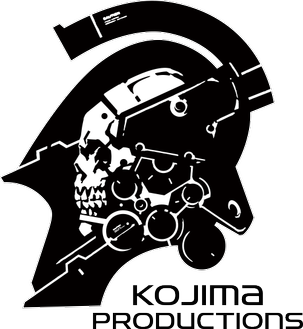
Kojima Productions Co., Ltd. is a Japanese video game development studio founded in 2015 by Hideo Kojima, creator of the Metal Gear series. It is the spiritual successor to a production team inside Konami also known as Kojima Productions originally founded in 2005. The independent Kojima Productions has a slightly altered Japanese name and is based in Shinagawa, Tokyo.

The Metal Gear franchise features a large number of characters created by Hideo Kojima and designed by Yoji Shinkawa. Its setting features several soldiers with supernatural powers provided by scientific advancements.

Metal Gear Solid: Portable Ops, officially abbreviated MPO, is a 2006 action-adventure stealth video game developed by Kojima Productions and published by Konami for the PlayStation Portable. The game was directed by Masahiro Yamamoto and written by Gakuto Mikumo, with series creator Hideo Kojima acting as producer.
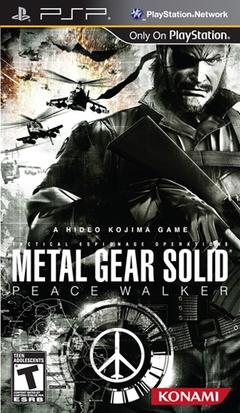
Metal Gear Solid: Peace Walker is a 2010 stealth game developed by Kojima Productions and published by Konami. It is the seventh Metal Gear game written, directed, and designed by Hideo Kojima, and the fifth installment of the Metal Gear Solid series, as well as the fourth Metal Gear game made specifically for the PlayStation Portable, following Metal Gear Solid: Portable Ops. A remastered version of the game titled Metal Gear Solid: Peace Walker - HD Edition was later released for the PlayStation 3 and Xbox 360 as part of the Metal Gear Solid HD Collection in North America and Europe and as a stand-alone retail release in Japan.
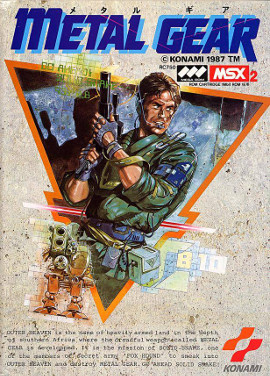
Metal Gear is an action-adventure stealth video game developed and published by Konami for the MSX2. It was released for the system in Japan and parts of Europe in 1987. Considered the game to popularize the stealth game genre, it was the first video game to be fully developed by Hideo Kojima, who would go on to direct most of the games in the Metal Gear series. A reworked port of the game was released for the Famicom a few months later, which later saw release in international markets for the NES over the following two years; this version was developed without Kojima's involvement and features drastically altered level designs, among other changes. An emulated Famicom version came with the special edition of Metal Gear Solid: The Twin Snakes on GameCube. A more faithful port of the MSX2 version was later included in Metal Gear Solid 3: Subsistence for the PlayStation 2, as well as in the HD Edition of the same game released for the PlayStation 3, Xbox 360 and PlayStation Vita, with these newer ports featuring a revised translation and additional gameplay features. The MSX version was also released for Wii Virtual Console and PC.

Metal Gear Solid V: The Phantom Pain is a 2015 action-adventure stealth video game developed by Kojima Productions and published by Konami. Directed, written, and designed by Hideo Kojima, it is the ninth installment in the Metal Gear franchise, following Metal Gear Solid V: Ground Zeroes, a stand-alone prologue released the previous year. Set in 1984, nine years after the events of Ground Zeroes, the story follows mercenary leader Punished "Venom" Snake as he ventures into Soviet-occupied Afghanistan and the Angola–Zaire border region to exact revenge on those who destroyed his forces and came close to killing him during the climax of Ground Zeroes.

Metal Gear Solid V: Ground Zeroes is a 2014 action-adventure stealth video game developed by Kojima Productions and published by Konami. It is the eighth game in the Metal Gear series directed, written and designed by Hideo Kojima, and serves as a prologue to Metal Gear Solid V: The Phantom Pain, released the following year. Set in 1975, a few months after the events of Metal Gear Solid: Peace Walker, the story follows Snake as he infiltrates an American black site in Cuba called Camp Omega, attempting to rescue Cipher agent Paz Ortega Andrade and former Sandinista child soldier Ricardo "Chico" Valenciano Libre.

Metal Gear Solid Delta: Snake Eater is an upcoming action-adventure stealth video game developed and published by Konami. It is a remake of the 2004 game Metal Gear Solid 3: Snake Eater, the fifth main entry in the Metal Gear franchise and the first chronological game overall. Like the original, the remake is set in 1964 and follows a FOX operative codenamed Naked Snake, who must save a Russian rocket scientist and sabotage the Shagohod, a Soviet nuclear superweapon - while also clearing his country from Soviet suspicion amid Cold War tensions and confronting his former mentor The Boss, who has defected to their side.


















